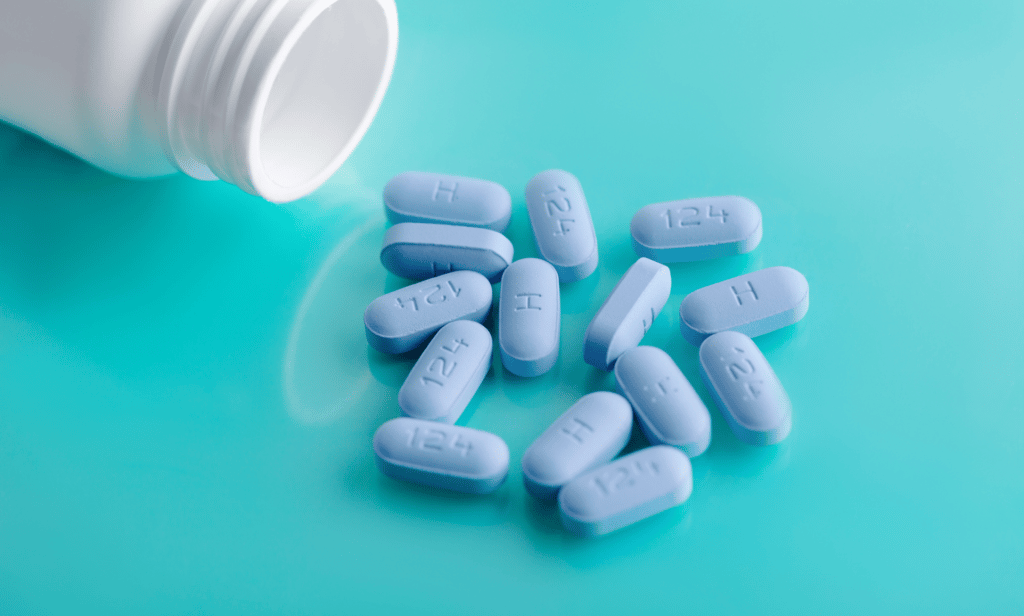HIV myths busted: Everything you need to know about your prevention options

England is on track to end new HIV transmissions by 2030. (Stock image via Getty)
England is on track to end new HIV transmissions by 2030. (Stock image via Getty)
Want to be part of ending new HIV transmissions this decade? Here’s what you need to know.
Over the last decade, the fight against HIV has been transformed by medical breakthroughs.
England is on track to end new transmissions by 2030, with the HIV prevention medication PrEP, alongside more traditional methods of prevention (HIV testing, condoms, and U=U), proving to “accelerate the downtrend in new HIV infections in recent years”, according to Robbie Currie, lead commissioner of London’s HIV prevention program branded: Do It London.
Jo, 27, from Hackney, has been taking the once-daily pill for two years. It works by preventing the HIV virus from replicating in the body.
“PrEP has totally changed my relationship towards sex,” they say. “Before, sex was always tinged with a slight uncertainty and fear in the aftermath, but since I’ve been taking it, I’ve been able to let go.”

PrEP (pre-exposure prophylaxis) is one of four proven methods which, when combined, can stop the spread of HIV. The other three are using condoms, regular HIV testing, and treatment upon diagnosis of HIV to achieve an “undetectable” status.
If people who have HIV have been taking effective HIV treatment and their viral load has been undetectable for 6 months or more, it means they cannot pass the virus on through sex. This is called undetectable=untransmittable (U=U).
Across London, people are combining these four methods to have great, safe sex while helping to stop the spread of HIV.
Benjamin, 32, from Bermondsey, has just become a PrEP user in the last month. Beforehand, he visited his local sexual health clinic every three months to get tested for sexually transmitted infections, including HIV, and he’ll continue to do so now.

“Before I used PrEP, I was pretty diligent about using condoms and getting tested,” he says. “PrEP doesn’t protect against all STIs, so I’ve still been using condoms most of the time and I’m still going to get tested every three months.” (Taking regular HIV tests is a requirement for PrEP).
Phil, 34, from Haringey, was diagnosed with HIV in 2018. He takes one pill every day and is “undetectable”, so he can’t pass the virus on to any sexual partners.
“One thing I was so happy to learn is that if you’re diagnosed with HIV, like me, and you get access to treatment early, then you can live a long life,” he says. “And you can still feel good about yourself and have great sex.”
HIV myths busted
Thanks to PrEP, improved access to testing and other medical advancements, London and England as a whole are on track to end new HIV transmissions by 2030 – something which would have once seemed inconceivable.
But there are still challenges ahead to reach the goal. Currie says that misconceptions around HIV are still an issue and HIV related stigma is still present.
“People aren’t aware of how much treatment and prevention options have advanced,” he says. “And one of the biggest misconceptions is that someone with HIV can still pass it on if they are on effective treatment, which we know isn’t true.”

Another misconception, Currie says, is that people on HIV treatment have drastically different health outcomes in later life.
“If you have HIV and receive treatment early, there is no reason why you won’t have a normal lifespan,” he says.
Something else people aren’t always aware of is that, if you have unprotected sex and you aren’t on PrEP, there is medication that can be taken for 72 hours afterwards.
PEP (post-exposure prophylaxis) is a short course of HIV medicines taken very soon after a possible exposure to the virus, to prevent it from taking hold in your body.
The best place to get PEP is a sexual health or HIV clinic, but if you need PEP over the weekend or outside of office hours, when clinics will often be closed, it’s available at accident and emergency departments.

In an ideal world, PrEP and condoms would prevent such a situation from arising. But sex doesn’t always pan out that way. “Now that we have PrEP, what we’re trying to do is shift the dial a bit,” Currie explains. “So if you’re at a period in your life where you may be more exposed to HIV, then we really want you to be on PrEP.”
The good news is that we now have the tools to eliminate HIV, because there are prevention and treatment medications that are effective.
“Our latest Do It London campaign called ‘Be sure, know the four’ seeks to raise the awareness and uptake of the methods of HIV prevention to those most at risk.” Currie says. “The campaign is funded by all of London’s local authorities who remain committed to ending new HIV diagnoses by 2030.”
There are four proven ways to prevent HIV. Choose a combination of methods to best suit your lifestyle and needs. For more information about HIV prevention, visit doitlondon.org
Be sure. Know the four.


